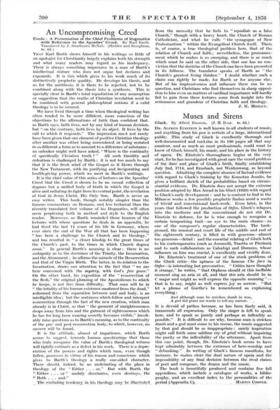An Uncompromising Creed
Credo : A Presentation of the Chief Problems of Dogmatics with Reference to the Apostles' Creed. By Karl Barth. Translated by J. Strathearn MeNab. (Hodder and Stoughton. 8s. ad.) THAT Karl Barth shows himself in his writings so little of an apologist for Christianity largely explains both his strength
and what many readers may regard as his inadequacy. There is always something impressive in a man of Barth's intellectual stature who does not argue but declares and expounds. It is this which gives to his work much of its distinctively prophetic quality. He develops his thesis, and as for the antithesis, it is there to be rejected, not to be combined along with the thesis into a synthesis. This is specially clear in Barth's total repudiation of any assumption
or suggestion that the truths of Christian 'revelation" need to be combined with general philosophical- notions if a valid
theology is to be secured. - .
We have lived through a time when theological writing has often tended to be more diffident, more conscious of the objections to the affirmations of faith than confident that, as Barth says, faith lives, not by any kind of human decision,
but on the contrary, faith lives by its object. It lives by the call to which it responds." The impression mu-it not rarely have been given that one element of positive Christian theology
after another was either being iurrendered or being' restated in so different a form as to amount to a difference of substance :
an onlooker might well have asked,-"Where is the continuity of specifically Christian truth ? All such timidity and
defeatism is challenged by Barth : it is not too much to say
that it is the fresh wind of the Gospel as it blows through the New- Testament, with its purifying and invigorating and health-giving power, which we meet in Barth's writings.
It is the chief value of this series of lectures on the Apostles' Creed that the Creed is shown to be no casual collection of dogmas but a unified body of truth in which the Gospel is alive and radiating its light from its central point, the revelation of God in Jesus Christ, His Only Son. Barth is never an easy writer. This book, though notably simpler than the famous commentary on Romans, and less technical than the
recently translated first volume of his Dogmatics, will often seem perplexing both in method and style to the English reader. Moreover, as --:Barth reminded those hearers of the lectures with whose questions he deals in an appendix,' he
had lived the last 14 years of his life in Germany, where ever since the end of the War all that has been 'happening " has been a challenge to the Church and to theology," and has resulted in " a closer kinship to the great times of the Church's past, to the times in which Church dogma arose." In general Barth's meaning is clear ; there is no ambiguity as to the doctrines of the Trinity, the Incarnation, and the Atonement ; he affirms the miracle of the Resurrection and that of the Virgin Birth. The latter, in its relation to the Incarnation, draws our attention to the fact that " we are
here concerned with the mystery, with God's free grace."
On the other hand, his exposition of the " resurrection of the flesh," the original phrasing of the Apostolicum to which he keeps, is not free from difficulty. That man will be in
" the totality of his human existence awakened from the dead," redeemed from the separation between soul and body, is an
intelligible idea ; but the sentences which follow and interpret resurrection through the fact of the new creation, which man already is in Christ, so that " the garment of unrighteousness drops away from him and the garment of righteousness which he has for long been wearing secretly becomes visible," inevit- ably raise questions as to Barth's meaning, as to the continuity of the pre- and post-resurrection body, to which, however, no answer will be found.
It is the attitude, almost of impatience, which Barth seems to suggest, towards human questionings that those who truly recognise the value of Barth's theological witness will rightly estimate as a defect in his work. There is a depre- ciation of the powers and rights which man, even though fallen, possesses in virtue of his reason and conscience which gives to Barth's theology a really one-sided character.
There should, indeed, be no underrating of the place in theology of. the " Either . . . or." But with Barth the " Either . . . or " unduly dominates, even destroys, the .f.` Both . . . and."
The excluding tendency in his theology may be illustrated
from the necessity that he feels to " repudiate as a false Church," though with a heavy heart, the Church of Roman Catholicism, and what he calls " the synagogue of New Protestantism" within the Evangelical Church itself. There is, of course, a true theological problem here, that of the relation of Church and faith.; nevertheless, the pronounce. ment which he makes is so sweeping, and there is so much which must be said on the other side, that one has no con- viction that the doctrine of the Church can have been presented in its fullness. The translator speaks of Barth as " the Church's greatest living thinker." I doubt whether _such a claim can rightly be made, for Barth or for anyone else. But of his impressiveness and influence there can be no question, and Christians who find themselves in sharp opposi- tion to him even on matters of cardinal importance will hardly fail to gain from-these lectures some fresh insight, into the seriousness and grandeur of Christian faith and theology.
J. K. MOZLEY.






































 Previous page
Previous page